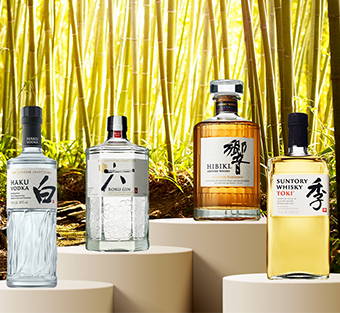
This article is part of a series, presented by House of Suntory. Discover more articles and recipes from the series here!
Since establishing itself as Japan’s first malt whisky distillery in 1923, the House of Suntory has defined itself by doing everything in a very particular way. When Shinjiro Torii founded the Yamazaki Distillery on the outskirts of Kyoto 99 years ago, he aimed to produce a uniquely Japanese whisky imbued with the very essence of his country’s nature, people, and traditions. It wasn’t an immediate success, but it was immediately clear that Torii wasn’t just establishing a product or a brand, but a philosophy.
By entrusting the best that Japanese resources had to offer to a team of skilled Japanese artisans, Torii sought to produce something better and more meaningful than a Japanese version of Scotch whisky. He created a way of crafting spirits that, three generations and nearly a full century later, still informs every aspect of the House of Suntory’s operations.
Every Step Matters
While many spirits makers tie their products to one superlative aspect or another — the best water, the rarest casks, the highest-quality grains, the most unique yeast — the House of Suntory prioritizes everything by prioritizing nothing. Embracing the Japanese cultural notions of monozukuri (a pride in innovation, artisanal skill, and technical prowess that pervades Japanese craftsmanship) and omotenashi (authentic hospitality), the House of Suntory has cultivated a production philosophy in which no step in the process is less important than any other. In other words, all tasks deserve the same level of dedication and attention. It’s this commitment to craftsmanship and quality that made Suntory the founding house of Japanese whisky and a north star for true spirits connoisseurs, whether they seek the very best in single malts, blended whisky, gin, or vodka.
Monozukuri literally translates to “manufacturing” or “the making of things.” However, that surface-level definition fails in describing a broader attitude toward production that perhaps best translates as “craftsmanship,” an appreciation and enthusiasm for the well designed and well constructed. Monozukuri in this sense describes a dedication to the pursuit of perfection, not just taking pride in one’s work but also in constantly striving to do one’s work better. Monozukuri abhors shortcuts, which is perhaps where it most neatly dovetails with omotenashi, a spirit of honest, from-the-heart hospitality that places the enjoyment and comfort of the guest above all else. Put another way, monozukuri is the thoughtful, skillful production of an object, while omotenashi is the heartfelt creation of a positive experience for someone else, sparing no effort to enhance that person’s enjoyment.
Translating Philosophy to Quality
While neither idea translates neatly into English, both translate seamlessly to the production and enjoyment of spirits. Take Suntory Haku Vodka®, for example. Made with 100 percent Japanese white rice, Haku® undergoes a unique process involving three distinct distillations and a filtration through bamboo charcoal. Similarly, Suntory Roku Gin® contains six unique botanicals sourced from Japan (“Roku” means “six”), each of which is distilled separately according to the best method of extracting each individual flavor. Both Haku® and Roku® are produced using local Japanese ingredients and distilled via methods that yield the best possible flavor profiles and textures, even if those methods are not particularly expedient or cost-efficient.
Meanwhile, Suntory’s relentless pursuit of elevated craftsmanship and heightened consumer experiences has earned its single malt whiskies a place among the world’s most coveted. Those from Shinjiro Torii’s original Yamazaki Distillery outside of Kyoto now rank among the most sought-after single malts in the world, alongside those hailing from Suntory’s Hakushu Distillery, founded by Torii’s son (and second-generation master blender) Keizo Saji in the forested mountains near Mt. Kaikomagatake in 1973.
The establishment of additional distilleries — in 1972 Keizo also established Suntory’s Chita Distillery, dedicated to producing high-quality grain whiskies — has allowed the House of Suntory to pursue the very essence of Japanese craftsmanship through the art of blending. If the various malt and grain whiskies produced by these distilleries represent the best that Japanese nature and craftsmanship have to offer, Suntory’s Hibiki® blended whiskies require an additional layer of monozukuri, challenging the house’s blenders to bring multiple flavor profiles into perfectly balanced oneness. Their artistry has earned Hibiki® many notable awards while serving as as an expression of Suntory’s guiding ethos.
This same blending artistry opens up near-limitless room for experimentation and innovation, and the House of Suntory continues to push the boundaries of modern whisky. Suntory Whisky Toki®, for example, shares DNA with Hibiki®, drawing upon both malt and grain whiskies from the Hakushu, Yamazaki, and Chita distilleries. But it does so via a blend that’s purpose-built for modern cocktails, combining heavy-type grain whiskies with lighter, more elegant malts. Bringing both fruity sweetness and herbal spice together in a precise balance, Toki® is a bartender’s best friend, one that performs particularly admirably in a well-crafted highball. Moreover, it’s a nod toward the House of Suntory’s future, one in which it continues to bring the best in Japanese nature and craftsmanship to bear in testing the art of the possible.
Today, each of the House of Suntory spirits reaches the consumer with its ultimate enjoyment in mind, just as Shinjiro Torii intended when he founded Japan’s first malt whisky distillery a century ago. The philosophy he established then — one not staked to any single product or process but to delivering the best possible quality and consumer experience — still guides the company he founded. This high level of quality is why those who appreciate truly exceptional spirits keep coming back to the House of Suntory.
This article is sponsored by House of Suntory.
Please drink responsibility, ©2022 Beam Suntory, Inc. Chicago, IL.
